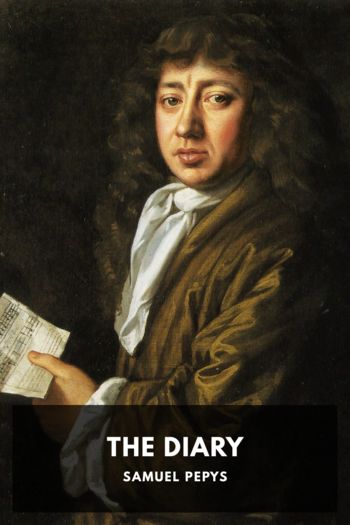The Diary - Samuel Pepys (red white and royal blue hardcover txt) 📗

- Author: Samuel Pepys
Book online «The Diary - Samuel Pepys (red white and royal blue hardcover txt) 📗». Author Samuel Pepys
No one who has followed the daily notes of Samuel Pepys from January, 1660, to May, 1669, but must feel sincere regret at their abrupt conclusion, more particularly as the writer lays down his pen while in an unhappy temper.
It is evident from the tone of his later utterances that Pepys thought that he was going blind, a belief which was happily falsified. The holiday tour in which Charles II and James, Duke of York, took so much interest appears to have had its desired effect in restoring the Diarist to health.
The rest of his eventful life must be sought in the history of the English Navy which he helped to form, and in his numerous letters, which on some future occasion the present editor hopes to annotate. The details to be obtained from these sources form, however, but a sorry substitute for the words written in the solitude of his office by Pepys for his own eye alone, and we cannot but feel how great is the world’s loss in that he never resumed the writing of his journal. All must agree with Coleridge when he wrote on the margin of a copy of the Diary: “Truly may it be said that this was a greater and more grievous loss to the mind’s eye of posterity than to the bodily organs of Pepys himself. It makes me restless and discontented to think what a Diary equal in minuteness and truth of portraiture to the preceding from 1669 to 1688 or 1690 would have been for the true causes, process and character of the Revolution.”4542
Most works of this nature are apt to tire when they are extended over a certain length of time, but Pepys’s pages are always fresh, and most readers wish for more. For himself the editor can say that each time he has read over the various proofs he has read with renewed interest, so that it is with no ordinary feelings of regret that he comes to the end of his task, and he believes that every reader will feel the same regret that he has no more to read.
In reviewing the Diary it is impossible not to notice the growth of historical interest as it proceeds. In the earlier period we find Pepys surrounded by men not otherwise known, but as the years pass, and his position becomes more assured, we find him in daily communication with the chief men of his day, and evidently everyone who came in contact with him appreciated his remarkable ability. The survival of the Diary must ever remain a marvel. It could never have been intended for the reading of others, but doubtless the more elaborate portraits of persons in the later pages were intended for use when Pepys came to write his projected history of the Navy.
The only man who is uniformly spoken well of in the Diary is Sir William Coventry, and many of the characters introduced come in for severe castigation. It is therefore the more necessary to remember that many of the judgments on men were set down hastily, and would probably have been modified had occasion offered. At all events, we know that, however much he may have censured them, Pepys always helped on those who were dependent upon him.
H. B. W.
EndnotesShelton’s work was frequently reprinted, and the edition of 1691 is in the Pepysian Library. The late Mr. John E. Bailey read a very interesting paper on The Cipher of Pepys’s Diary, before the Manchester Literary Club, on December 14th, 1875, an abstract of which has been printed. ↩
Mr. W. C. Pepys has paid great attention to the history of his family, and in 1887 he published an interesting work entitled Genealogy of the Pepys Family, 1273–1887, London, George Bell and Sons, which contains the fullest pedigrees of the family yet issued. ↩
February 10th, 1661–62. ↩
“We went through Horslydown, where I never was since a little boy, that I went to enquire after my father, whom we did give over for lost coming from Holland.”
Diary, Jan. 24th, 1665–66John Pepys appears, from the State Papers, to have visited Holland as late as 1656.
“That passes be graunted to goe beyond ye seas to ye persons following, vizt, To John Pepys and his man, with necessaryes for Holland, being on the desire of Mr Samll Pepys.
“Ordered by the Council, Thursday, 7th August, 1656.”
↩
See Diary, June 17th, 1666. ↩
The following is a copy of John Pepys’s will:
“My Father’s Will.
[Endorsement by S. Pepys.]
“Memorandum. That I, John Pepys of Ellington, in the county of Huntingdon, Gentn, doe declare my mind in the disposall of my worldly goods as followeth:
“First, I desire that my lands and goods left mee by my brother, Robert Pepys, deceased, bee delivered up to my eldest son, Samuell Pepys, of London, Esqr., according as is expressed in the last Will of my brother Robert aforesaid.
“Secondly, As for what goods I have brought from London, or procured since, and what moneys I shall leave behind me or due to me, I desire may be disposed of as followeth:
“Imprimis, I give to the stock of the poore of the parish of Brampton, in which church I desire to be enterred, five pounds.
“Item. I give to the Poore of Ellington forty shillings.
“Item. I desire that my two grandsons, Samuell and John Jackson, have ten pounds a piece.
“Item. I desire that my daughter, Paulina Jackson, may have my largest silver tankerd.
“Item. I desire that my son John Pepys may have my gold seale-ring.
“Lastly. I desire that the remainder of what I shall leave be equally distributed between my sons Samuel





Comments (0)